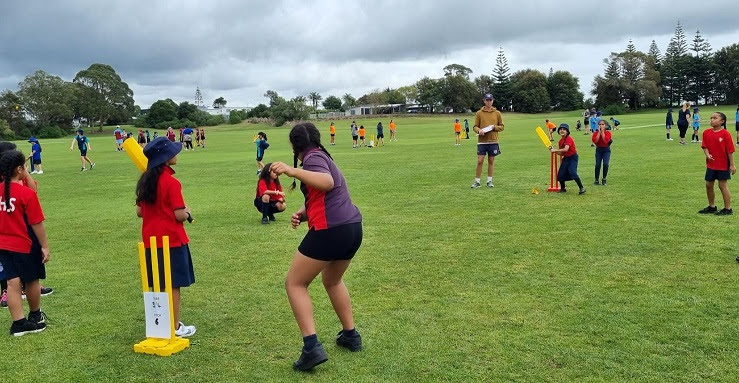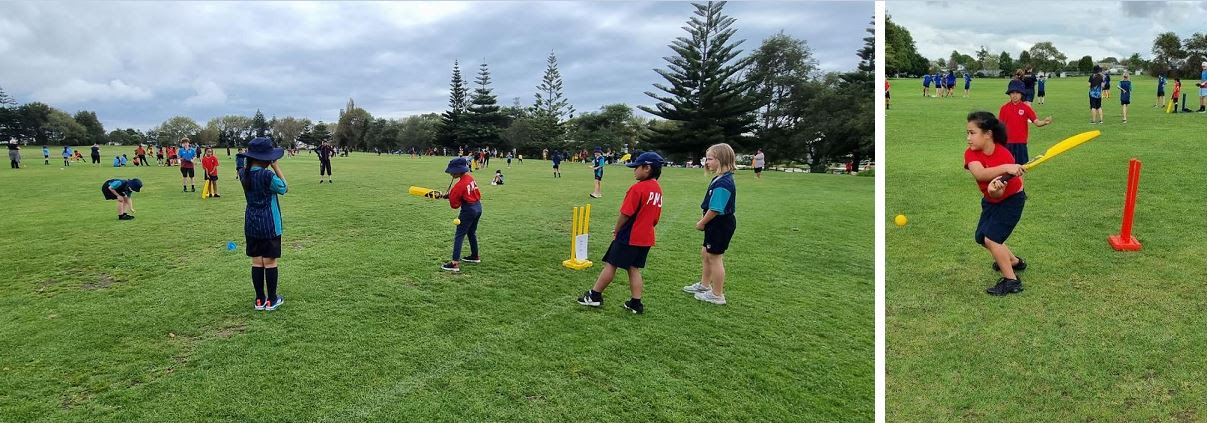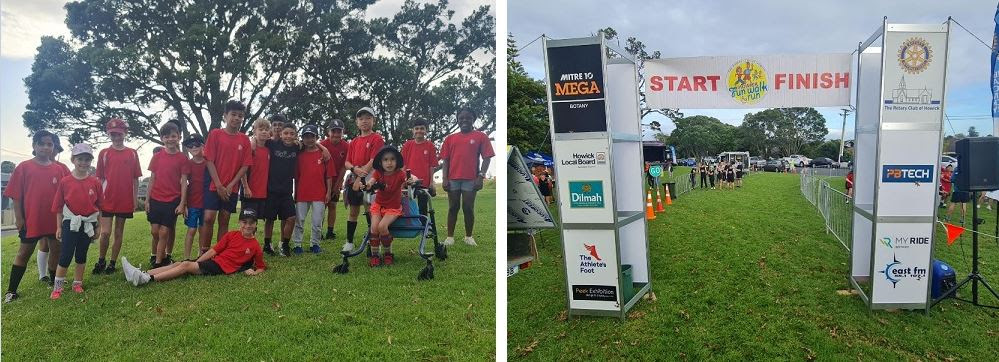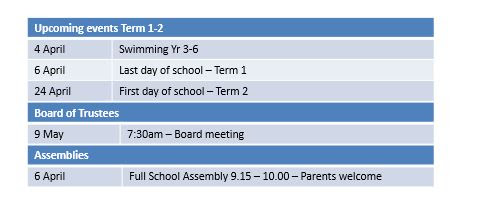
:
:
It has been a challenging term with the short weeks, weather events and teachers strike. It was wonderful to come together as a community for the school picnic, we estimated 1500 to 2000 people were here.
As per the Signmee notification last week, many schools have chosen to have a teacher only day on April 24th the first day back in Term 2. We have chosen not to, as we believe it is important to get back into normal teaching and learning programmes. So Monday 24th will be a normal school day.
END OF TERM REMINDERS
Lost property
We have quite a few items in lost property so if your child has misplaced any clothing please get them check the boxes outside the whanau centre and their class cloak bay.
Sunhats are not compulsory until Term 4.
STUDENT LEADERS TRIP TO WELLINGTON
This trip is designed to give House Captains an opportunity to see leadership in action and develop an understanding of how groups of people work together to lead effectively. In the lead up to the trip, House Captains will learn how Parliament works, including the process for new laws.
During the tour the students will visit:
- The House of Representatives (debating chamber)
- The Legislative Council Chamber
- A select committee room
- The Theatrette (Press conference room)
- The Parliamentary Library
We were fortunate to receive a grant to assist with travel costs
EMERGENCY CONTACTS
It is important we have all your contacts correct including address, cell phone and an emergency contact in case we cannot get hold of a parent. We ring if your child has had any knock to the head or injury we feel needs further medical attention.
TERM 2
School starts back on Monday 24th April at 9.00 am – Normal school day
PUBLIC HOLIDAY
School closed Tuesday April 25th for Anzac Day.
Significance of Anzac Day
ANZAC stands for Australian and New Zealand Army Corps. April 25th marks the first major military action fought by the Australian and New Zealand forces during World War 1, at Gallipoli.
STUDENT PROGRESS AND ACHIEVMENT REPORTS AND INTERVIEWS
These will take place early in Term 3 as we want to try and have a full term of solid teaching and learning opportunities. We will send more information early next term
OUR SCHOOL VALUES AND PROMOTONG GOOD MANNERS
Our core values of
Respect – Kauanuanu
Responsibility- Kawenga
Honesty – Pononga
Kindness- Manaaki
are part of who we are at Pakuranga Heights.
We encourage all students to greet adults and each other, stand back and let others through, help those who need help without expecting reward, be kind, honest, and responsible in all that we do and say. A simple please and thank you goes a long way all throughout life Thank you for the great job that you as parents are obviously doing as your children look to us as adults to be their role models. We often get great feedback from visitors about the warm and friendly culture and environment that is our school.
ENCOURAGING CONVERSATION AT DINNER TIME
Time is precious and for many families it is a juggle to get everyone sitting down for dinner. There here has been a lot of research showing the benefits of spending dinnertime together, as a family, and the conversations that occur around the table are vital to helping children become successful adults and productive citizens in society.
The following benefits are from an Inspire Conversation website:
THE BENEFITS OF DINNER TABLE CONVERSATIONS ARE IMPORTANT FOR FUTURE CAREER SUCCESS
1. Dinner table conversations boost intellectual curiosity
2. A lower risk of childhood obesity
3. Less depression at any age
4. A stronger bond between family members
5. Better communication skills
6. Higher self-esteem
7. Active listening skills are learned
8. Enhanced logical reasoning
9. A better ability to analyse
10. Strong negotiating skills
11. Creative problem solving
12. All of these skills can be learned during dinnertime conversations but they transfer into the workplace and chosen career.
Here are some fun questions from a parent site called anxioustoddlers.com
1. If you could only eat one fruit forever – what fruit would it be?
2. What are three words you would uses to describe yourself?
3. What do you think you are good at?
4. If you had to pick only one – would you want to be a great singer or a great dancer?
5. If you went to another planet – what would you bring with you?
6. If you were a teacher what rules would you make?
7. If you could make your whole house out of food – what food would you use?
8. If you could have one super power what would it be?
In our family each night we had Best Thing –Worst Thing or as some call it ‘THE GRATITUDE SANDWICH’
This little gratitude round is the perfect way to put a positive spin on your day. Everyone gets to tell the group two good things that happened that day and one thing that wasn’t so great.
Make sure to say one of the good things first, then talk about something that you didn’t like, and end with another positive event that happened to make the story a sandwich that’s easy to digest! Adults and children participate.
WHY COMPOSITE CLASSES?
Every year friends and parents ask me about the difference between composite and straight year level classes. I will attempt to explain the differences and advantages.
Composite classes usually occur when there are too many students for one class, but not enough for two classes of the same year group. The Government provides our staffing based on our numbers so we have to organise classes based on our allocated staffing.
Composite classes have a controversial history, with parents often believing that their child maybe disadvantaged by being in one. While many can see the benefits of composite classes for the accelerated learning of younger children, they also fear the older students will be bored or held back with easier work.
The key to appreciating the benefits of composite classes is in understanding that growth is determined in stages and not by ages. Ironically, every class is already a composite in terms of the range in school starting ages and the different academic abilities of the students. The Ministry of Education groups student learning into levels, usually over a two to three year period. The emphasis is on the progression of the individual through logical stages of learning. In every class – including composite classes – students are assessed to ascertain their current level of learning. The teachers then design and implement a program that caters for all students’ needs, while keeping in mind the content in the level that must be taught.
Before a composite class is formed, we consider the children’s academic, social and emotional stages and decide which would be the best way of organising the class or classes.
Composite classes can have many advantages for teachers and students:
- Teaching in a composite class compels teachers to think of children as individuals.
- The techniques of group teaching and of individual instruction can be applied in composite classes.
- Learning-through-teaching is promoted when students at different stages of learning can help each other with their work.
- Composite classes can be arranged so that they are a means for catering for the special needs of talented children as well as slower learners.
The latest teaching and learning materials are being developed with composite classes in mind, allowing teachers to simultaneously develop an understanding of learning outcomes at different levels within a Level. Wherever possible, the teaching and learning activities within each Level are parallel to each other, ensuring that teachers can introduce core concepts to the whole class and differentiate instruction for the range of learners in the classroom.
I was more than happy for my own children to be in composite classes.
Should you have any concerns or questions about this please do not hesitate to ring or come and see one of the senior team.
We look forward to seeing you in Term 2
Fintan, Sue and Monique
:
On Monday 27 March, Pakuranga Heights sent two teams to the Cricket Girls Smash at Lloyd Elsmore. The aim of the day was to have fun playing cricket and that is exactly what our team of year 3 and 4 and year 5 and 6 girls did. Many of the students participating hadn’t played a lot of cricket but by the end of the day they had! The best part of the day was to see our students displaying our school values. Our year 3 and 4 team were recognised by the referee and organisers for their kindness towards another participating school – what a proud moment! However, the day would’nt have been successful without the support from our lovely parent helpers – a big thank you to them.
:
20 PHS students and some keen parents participated in the Howick Fun Run this year. Great participation by all. Over $1000 was raised by local schools attending to support the Howick Coast Guard.
:
In Room 6, we read and discuss a shared book as a class every week. One of the books we have read is Dan and the Parrot by Joy Cowley. We incorporated our book with this term’s inquiry by learning how to draw parrots. The students sketched a parrot in pencil and vivid. They then used pastels, dye and paint to bring their parents to life.










